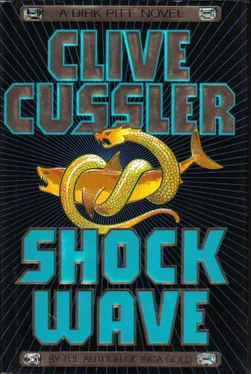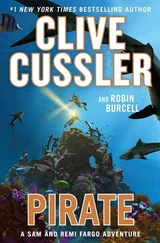Clive Cussler - Shock Wave
Здесь есть возможность читать онлайн «Clive Cussler - Shock Wave» весь текст электронной книги совершенно бесплатно (целиком полную версию без сокращений). В некоторых случаях можно слушать аудио, скачать через торрент в формате fb2 и присутствует краткое содержание. Год выпуска: 1996, ISBN: 1996, Издательство: Simon & Schuster, Жанр: Детектив, на английском языке. Описание произведения, (предисловие) а так же отзывы посетителей доступны на портале библиотеки ЛибКат.
- Название:Shock Wave
- Автор:
- Издательство:Simon & Schuster
- Жанр:
- Год:1996
- ISBN:978-0684802978
- Рейтинг книги:5 / 5. Голосов: 1
-
Избранное:Добавить в избранное
- Отзывы:
-
Ваша оценка:
- 100
- 1
- 2
- 3
- 4
- 5
Shock Wave: краткое содержание, описание и аннотация
Предлагаем к чтению аннотацию, описание, краткое содержание или предисловие (зависит от того, что написал сам автор книги «Shock Wave»). Если вы не нашли необходимую информацию о книге — напишите в комментариях, мы постараемся отыскать её.
Shock Wave — читать онлайн бесплатно полную книгу (весь текст) целиком
Ниже представлен текст книги, разбитый по страницам. Система сохранения места последней прочитанной страницы, позволяет с удобством читать онлайн бесплатно книгу «Shock Wave», без необходимости каждый раз заново искать на чём Вы остановились. Поставьте закладку, и сможете в любой момент перейти на страницу, на которой закончили чтение.
Интервал:
Закладка:
“I’ve never performed postmortem examinations on aquatic creatures before.”
“Humans, porpoises and seals are all mammals under the skin.”
“You, my dear admiral, have a very intriguing case on your hands.”
“What did they die from?”
Hunt paused to empty half the cup. “Clinically, the deaths were caused by a disruption of the ossicular chain that consists of the malleus, incus and the stapes of the middle ear, which you may recall from your high school physiology class as the hammer, anvil and stirrup. The stapedial foot plate was also fractured. This caused debilitating vertigo and extreme tinnitus, or a roaring in the ears, all culminating in a rupture of the anterior inferior cerebellar artery and causing hemorrhaging into the anterior and middle cranial fossae inside the base of the skull.”
“Can you break that down into simple English?”
“Are you familiar with the term ‘infarction’?” asked Hunt.
“It sounds like slang.”
“Infarction is a cluster of dead cells in organs or tissue that results from an obstruction, such as an air bubble, that cuts off circulating blood.”
“Just where in the bodies did this thing take place?” inquired Sandecker.
“There was swelling of the cerebellum with compression of the brain stem. I also found that the vestibular labyrinth—”
“Come again?”
“Besides relating to other bodily cavities, ‘vestibular’ also pertains to the central cavity of the bony labyrinth of the ear.”
“Please go on.”
“The vestibular labyrinth appeared to be damaged by violent displacement. Somewhat as in a fall into deep water, where the hydraulic compression of air perforates the tympanic membrane as water is forced into the external ear canal.”
“How did you arrive at this conclusion?”
“By applying a standard protocol to my investigation, I used magnetic resonance imaging and computer tomography, a diagnostic technique using X-ray photographs that eliminate the shadows of structures m front of and behind the section under scrutiny. Evaluation also included hematologic and serologic studies and lumbar puncture.”
“What were the symptoms at the onset of the disorder?”
“I can’t speak for the porpoises or seals,” explained Hunt. “But the pattern among the humans was consistent. The sudden and intense vertigo, a dramatic loss of equilibrium, vomiting, extreme paroxysmal cranial pain and a sudden convulsion that lasted less than five minutes, all resulting in unconsciousness and then death. You might compare it to a stroke of monster proportions.”
“Can you tell me what caused this trauma?”
Hunt hesitated. “Not with any degree of accuracy.”
Sandecker was not to be put off. “Take a wild guess.”
“Since you’ve put my back to the wall, I’d venture to say your fishermen, the porpoises and seals expired from extreme exposure to high-intensity sound.”
January 22, 2000
Near Howland Island, South Pacific
To the crew lining the rails of Mentawai, an Indonesian freighter bound from Honolulu to her next port of call, Jayapura in New Guinea, the sight of an awkward-looking craft in the middle of the ocean was highly unusual if not downright remarkable. Yet the Ningpo-design Chinese junk sailed serenely through the one-meter-high swells that rolled against her bow from the east. She looked magnificent, her brightly colored sails filled with a southwesterly breeze, her varnished wood sparkling under a golden-orange rising sun. Two large eyes that I crossed when sighted head-on were painted on her bows, born from the traditional faith that they would see her through fog and stormy seas.
The Tz’u-hsi, named after the last Chinese dowager empress, was the second home of Hollywood actor Garret Converse, never a nominee for an Academy Award but the biggest box-office action hero on the silver screen. The junk was twenty-four meters in length with a beam of six meters, built from top to bottom of cedarand teakwood. Converse had installed every amenity for the crew’s accommodations and the latest in navigational technology. No expense was spared. Few yachts were as luxuriously embellished. A master adventurer in the mode of Errol Flynn, Converse had sailed Tz’u-hsi from Newport Beach on a round-the-world cruise and was now running on the final leg across the Pacific, passing within fifty kilometers of Howland Island, Amelia Earhart’s destination when she disappeared in 1937.
As the two ships plodded past each other on opposite courses, Converse hailed the freighter over the radio.
“Greetings from the junk Tz’u-hsi. What ship are your”
The freighter’s radio operator replied, “The freighter Mentawai out of Honolulu. Where are you bound?”
“Christmas Island, and then to California.”
“I wish you clear sailing.”
“The same to you,” Converse answered.
The captain of Mentawai watched the junk slip astern and then nodded toward his first officer. “I never thought I’d see a junk this deep in the Pacific.”
The first officer, a man of Chinese descent, nodded disapprovingly. “I crewed on a junk when I was a young boy. They’re taking a great risk sailing through the breeding grounds of typhoons. Junks are not built for heavy weather. They ride too high and have a tendency to roll crazily. Their huge rudders are easily broken off by a rough sea.”
“They’re either very brave or very mad to tempt the fates,” said the captain, turning his back on the junk as it grew smaller in the distance. “As for me, I feel more comfortable with a steel hull and the solid beat of engines under my decks.”
Eighteen minutes after the freighter and junk crossed paths, a distress call was heard by the United States container carrier Rio Grande, bound for Sydney, Australia, with a cargo of tractors and agricultural equipment. The radio room was directly off the spacious navigation bridge, and the operator had only to turn to address the second officer, who stood the early morning watch.
“Sir, I have a distress signal from the Indonesian cargo freighter Mentawai.”
The second officer, George Hudson, picked up the ship’s phone, punched a number and waited for an answering voice. “Captain, we’ve picked up a distress signal.”
Captain Jason Kelsey was about to take his first forkful of breakfast in his cabin when the call came from the bridge. “Very well, Mr. Hudson. I’m on my way. Try and get her position.”
Kelsey wolfed down his eggs and ham, gulped half a cup of coffee and walked through a short passageway to the navigation bridge. He went directly to the radio room.
The operator looked up, a curious look in his eyes. “Very strange signal, Captain.” He handed Kelsey a notepad.
Kelsey studied it, then stared at the radio operator. “Are you sure this is what they transmitted?”
“Yes, sir. They came in quite clearly.”
Kelsey read the message aloud. “All ships come quick. Freighter Mentawai forty kilometers south-southwest of Howland Island. Come quick. All are dying.” He looked up. “Nothing more? No coordinates?”
The radio operator shook his head. “They went dead, and I haven’t been able to raise them again.”
“Then we can’t use our radio direction-finding systems.” Kelsey turned to his second officer. “Mr. Hudson, lay a course for Mentawai’s last reported position southwest off Howland Island. Not much to go on without exact coordinates. But if we can’t make a visual sighting, we’ll have to rely on our radar to spot them.” He could have asked Hudson to run the course numbers through the navigation computer, but he preferred working by the old rules.
Hudson went to work on the chart table with parallel rulers, attached by swinging hinges, and a pair of dividers, and Kelsey signaled the chief engineer that he wanted Rio Grande to come to full speed. First Officer Hank Sherman appeared on the bridge, yawning as he buttoned his shirt.
Читать дальшеИнтервал:
Закладка:
Похожие книги на «Shock Wave»
Представляем Вашему вниманию похожие книги на «Shock Wave» списком для выбора. Мы отобрали схожую по названию и смыслу литературу в надежде предоставить читателям больше вариантов отыскать новые, интересные, ещё непрочитанные произведения.
Обсуждение, отзывы о книге «Shock Wave» и просто собственные мнения читателей. Оставьте ваши комментарии, напишите, что Вы думаете о произведении, его смысле или главных героях. Укажите что конкретно понравилось, а что нет, и почему Вы так считаете.












